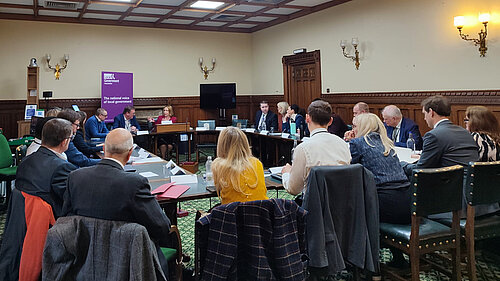Helen shines spotlight on signal sharing and end of landlines

North Shropshire MP Helen Morgan has led a digital roundtable event in Parliament, bringing together people from across the political divide to discuss the challenges being faced in the rural economy.
The event, organised alongside the Local Government Association, focused on the need to improve mobile phone signal and support rural residents during the phasing out of landline phones.
All of the major telecoms firms attended alongside rural interest groups and cross-party representatives who agreed that politicians and organisations must work together to combat digital exclusion.
Organisations in attendance included:
- Local Government Association
- EE, Three, Vodafone, and Virgin/O2
- BT
- Openreach
- Ofcom
- National Farmers Union
- Federation of Small Businesses
- Country Land Alliance
- Rural Services Network
- Age UK
- TalkTalk
Government Digital Connectivity Champion Simon Fell MP also attended, as did civil servants from the Department for Science, Innovation and Technology, who provided an update on the Shared Rural Network which is yet to hit its targets for addressing mobile signal blackspots.
Councillor Mark Hawthorne, the Conservative Leader of Gloucestershire County Council and Local Government Association Digital Exclusion lead, chaired the section of the meeting on local government involvement in the digital rollout.
Helen Morgan has proposed a new law to bring in ‘Rural Roaming’ and require firms to share signal in partial not-spots, if the rollout of improved services is not quick enough in rural areas like North Shropshire. A petition started in December has received nearly 1,000 signatures from North Shropshire constituents concerned by a lack of signal and supporting the change.
Helen remains concerned for residents of rural areas who struggle to access mobile signal and therefore are reliant on their landline connection, which is now being phased out.
Shropshire is one of the worst connected parts of England, with just 31% of premises in rural North Shropshire having 4G phone coverage from all four network operators. As well as this, 7% have no signal from any network. This compares to 50% of rural premises across England being able to access 4G data from all operators, and 92% of premises in urban areas.
She has also repeatedly pressed ministers for improvements to the rollout of the Shared Rural Network, most recently raising the total not-spot between Cockshutt and Welshampton. Helen has also highlighted the lack of signal in the area with the Minister for Science, Innovation and Technology in the House of Commons.
Helen Morgan, MP for North Shropshire, said, “Rural mobile signal must be improved and rural residents must be given reliable communication methods before copper wire landlines are phased out. We need action – and fast.
“It was useful to bring together both the organisation that are capable of making these positive changes and groups representing the people who will benefit.
“The rollout of the Shared Rural Network has been disappointingly slow, and we really risk leaving huge numbers of people in our most rural and isolated areas behind unless things improve.
“That’s why I’ve been calling to change the law and bring in ‘Rural Roaming’ to stop the countryside being left behind.
“I was pleased to hear companies are committed to helping people who currently rely on their landlines to communicate. It’s clear that the Government and industry need to work together to support our vulnerable residents and combat digital exclusion.”
